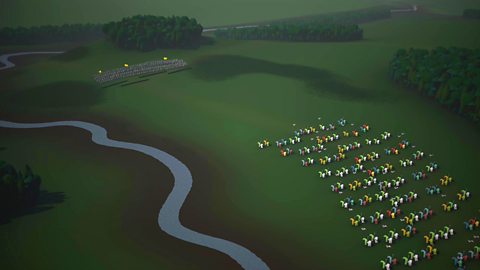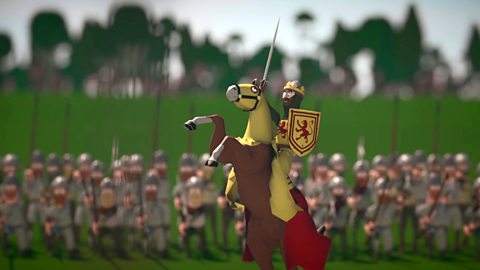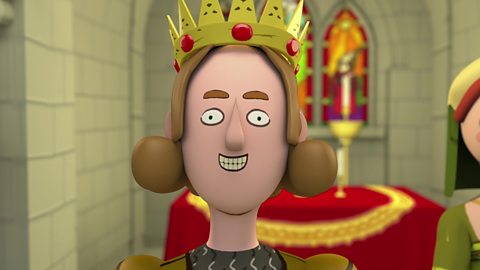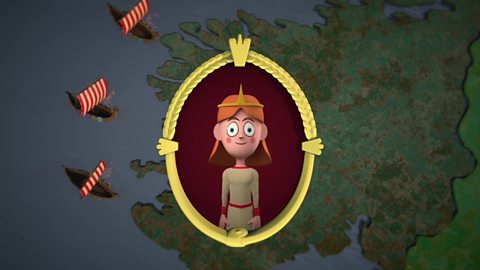Robert the Bruce's Scottish army had been beaten by the English at the Battle of Methven in 1306. One year later, his forces faced the same English general at Loudoun. This time, Bruce would be victorious.
Find out about the Battle of Loudoun Hill, 1307
NARRATOR:The Wars of Independence. The Battle of Loudoun Hill 1307.
When Robert the Bruce became King of Scotland in 1306, his first big battle against the English was a disaster! He was beaten. His army almost destroyed.
But Now in May 1307. After a year of being on the run, it’s time to face that same English commander that beat him, The Earl of Pembroke. It’s Bruce’s turn to stand and fight.
You are one of Bruce’s men. Not a soldier. A woodcutter. You’ve been busy.
AXEMAN:My axe is the only weapon I’ve got. I’ve been using it to sharpen stakes, big wooden spikes. We’ve put spikes at the bottom of pits, big trenches.
There’s only hundreds of us. But thousands of them. Without King Robert’s brilliant plan, we wouldn’t stand a chance. He’s got it all worked out.
We’ve got our backs to the hill, and a bog on both sides. There’s only one way the enemy can get to us. And that’s where our pits are!
We’ve laid a trap for the English. It better work. Look at them! Five times as many of them
Oh… They’re charging!
Oh… The first knights all crash into the pits and onto the spikes. And then the knights behind them, they can’t stop. So, they pile up. And pile up.
The noise is terrible. Hundreds of English knights die.
If it wasn’t for those pits, and our sides, our flanks, protected by the bog, we’d all be dead.
But King Robert the Bruce knew the land. He had a plan. He’s a clever man.
I think he’s going to be a good King.
NARRATOR:Robert the Bruce would continue his fight against the English for the next seven years, taking back Scotland Castle by Castle before finally facing them one last time in battle at Bannockburn in 1314.
How did Robert the Bruce win the battle?
This battle was very important for Robert the Bruce. He was a new king who needed to prove himself. In 1306 he had been beaten in a surprise attack at Methven, near Perth, by English forces controlled by the Earl of Pembroke.
In 1307, Bruce caught up with the Earl and his English army in Ayrshire. Bruce had learned from his defeat at Methven and this time he was prepared.
What is 'guerrilla warfare'?
Guerrilla warfare is where a smaller army fights a bigger army. The small army needs to be clever and well-prepared to stand any chance of winning. It must use surprise attacks rather than meeting head-to-head on a battlefield.
This is what Bruce did to beat the larger English army at Loudoun. Bruce chose the land he would fight them on very carefully and laid traps for the English knights on horseback.
Battle: Key moments

Image caption, Bruce positioned his army at the top of a hill. It had boggy ground on either side that the English knights couldn't go around. They would have to charge straight at them.
1 of 6
Bruce's plan
Click on the interactive guide of the battlefield to learn more about how Robert the Bruce used the land at Loudoun Hill to his advantage:
More on Wars of Independence
Find out more by working through a topic
- count12 of 13

- count13 of 13

- count1 of 13

- count2 of 13
